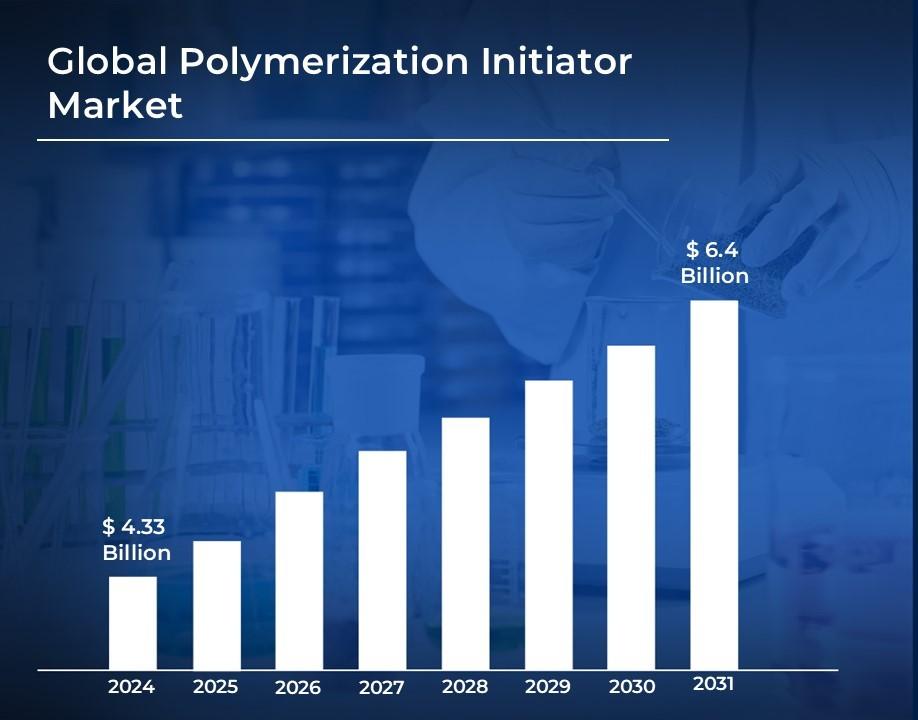Polymerization Initiator Market's Role in Smart Material Development
The polymerization initiator market plays a critical role in the development and evolution of smart materials. As industries across the globe move towards more intelligent and adaptive systems, the role of advanced materials in driving innovation cannot be overstated. Polymerization initiators, which are chemical compounds used to start or control polymerization reactions, are fundamental to creating smart polymers that can respond to external stimuli like temperature, light, pressure, and pH.
Understanding Polymerization Initiators
Polymerization initiators are substances that trigger the polymerization of monomers into polymers. These initiators are crucial in various polymerization methods, including free-radical, anionic, cationic, and condensation polymerizations. In each process, the initiator creates an active site that begins the chain reaction necessary for polymerization to occur. This makes initiators the backbone of polymer chemistry, especially in the synthesis of materials with specific properties tailored to particular functions.
Smart Materials and Their Importance
Smart materials are materials that can adapt to their environment in some way. They respond to external stimuli, altering their properties, behavior, or performance in response to changes in temperature, pressure, moisture, electric fields, magnetic fields, and even chemical stimuli. Examples of smart materials include:
- Shape-memory polymers that return to a pre-determined shape when exposed to a particular temperature.
- Conductive polymers that can alter their electrical properties in response to an external stimulus.
- Self-healing materials that can repair themselves after being damaged.
These materials are increasingly being used in high-performance applications such as robotics, healthcare (e.g., drug delivery systems), aerospace, and consumer electronics.
The Role of Polymerization Initiators in Smart Material Development
-
Tailoring Material Properties
Polymerization initiators enable precise control over the molecular structure of polymers. The type and concentration of initiators used can influence the polymer’s molecular weight, branching, and crosslinking density. By carefully selecting these initiators, scientists can produce polymers with highly specialized properties suited for use in smart materials. For instance, polymers with shape-memory capabilities require a certain molecular arrangement, which can be controlled through the polymerization process.
-
Stimuli-Responsive Polymers
Stimuli-responsive (or "smart") polymers are designed to change their physical properties in response to specific environmental triggers. The use of specific polymerization initiators is crucial to achieving the desired polymer structure that will exhibit such responsiveness. For example, photoresponsive polymers, which change properties when exposed to light, require precise polymerization control to ensure that the light-sensitive functional groups are properly incorporated into the polymer matrix. This can only be achieved by choosing the correct initiators that allow for such incorporation.
-
Enhancing Polymerization Efficiency
Modern applications of smart materials require polymers with controlled and uniform molecular structures. This often necessitates a higher degree of polymerization precision and the efficient use of initiators. Advances in polymerization initiators—such as the development of more efficient and environmentally friendly initiators—have led to better-controlled polymerization processes. These advancements directly affect the quality of smart materials, contributing to the enhancement of their functionality and sustainability.
-
Creation of Complex Architectures
Many smart materials, particularly those used in advanced sensors or biomedical applications, require complex polymer architectures that are difficult to create with traditional methods. However, new types of polymerization initiators, such as those used in controlled/living polymerization techniques (like ATRP, RAFT, and NMP), allow for the creation of polymers with highly defined architectures (e.g., block copolymers, dendrimers). These complex structures can impart new functionalities to smart materials, such as self-healing capabilities, responsive coatings, or even intelligent drug delivery systems.
-
Customization for Specific Applications
The versatility of polymerization initiators allows researchers to customize polymers for specific smart material applications. Initiators can be selected based on the application requirements, such as biocompatibility for medical devices or enhanced conductivity for electronic devices. In the biomedical field, for example, initiators are used to synthesize polymers for use in controlled drug delivery, where the polymer’s degradation rate must match the release profile of the drug.
Market Trends and Innovations
The global polymerization initiator market is expected to experience significant growth driven by advancements in materials science, particularly in the fields of smart materials, nanotechnology, and 3D printing. As industries increasingly demand more functional and adaptive materials, the polymerization initiator market is evolving to meet these needs. The shift towards sustainable and eco-friendly polymerization processes is also creating demand for green initiators that reduce environmental impact.
Key trends in the polymerization initiator market include:
- Sustainability Focus: There is a growing emphasis on developing bio-based or environmentally friendly polymerization initiators, reducing the carbon footprint of polymer production.
- Technological Innovation: Advanced polymerization techniques, such as reversible addition-fragmentation chain transfer (RAFT) and atom transfer radical polymerization (ATRP), are being used to enhance the precision and functionality of polymerization processes.
- Smart Packaging and Sensors: The increasing demand for smart packaging materials, sensors, and medical devices is driving the growth of the polymerization initiator market, as these materials require high-performance, stimuli-responsive polymers.
Conclusion
Polymerization initiators are at the heart of developing smart materials, with the ability to control polymerization processes that lead to materials with tailored properties. As industries move toward more intelligent, adaptive materials, the role of polymerization initiators will continue to grow. Whether for medical, aerospace, or consumer electronics applications, the polymerization initiator market’s impact on smart material development is profound and will likely drive significant technological advancements in the coming years.







